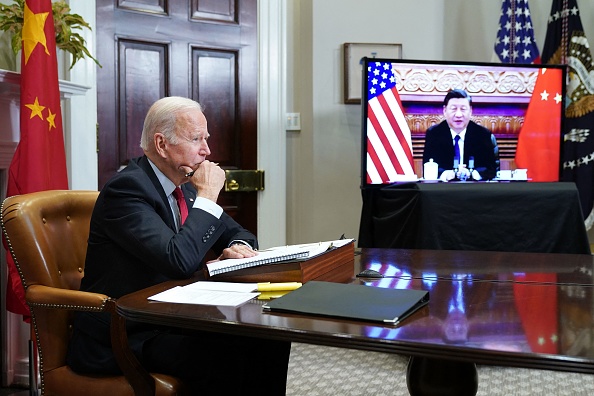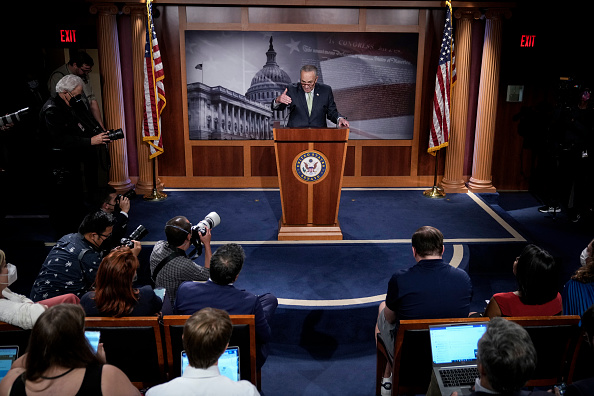
 Playing with Fire
Playing with FirePresidents Joe Biden and Xi Jinping held a lengthy call, which largely focused on the issue of Taiwan. Xi sent a strong warning to the U.S. against meddling in China's dealings with Taiwan and warned against the U.S. House Speaker Nancy Pelosi's possible visit to the island that the mainland claims as its own territory. However, the two sides made little progress either on that issue or on trade, technology or other irritants.
The U.S. readout of the meeting said that the call was a part of the Biden Administration's efforts to maintain and deepen lines of communication between the United States and the PRC and responsibly manage the two country's differences and work together where interests align.
However, Chinese state media reported that Xi told Biden that the United States should abide by the "one-China principle" and stressed that China firmly opposed Taiwanese independence and "interference" by external forces.
"Those who play with fire will only get burnt," Xi was quoted as telling Biden. "[We] hope the US side can see this clearly."
Biden and Xi did agree to begin arrangements for a face-to-face summit, which will be their first in-person meeting since Biden has taken office.
 Stand Off
Stand OffA U.S. aircraft carrier and strike group have entered the South China Sea as part of what the 7th Fleet said was a scheduled operation amid rising tensions with China over Nancy Pelosi's potential Taiwan visit. The ship's deployment comes after Beijing warned it would 'take strong measures' if the U.S. house speaker visits the island
Pelosi is set to leave for the trip today, however it is not yet clear whether Taiwan will appear on her itinerary, which will include stops in Japan, Indonesia and Singapore.
According to a U.S. Navy Spokesperson, the carrier is "continuing normal, scheduled operations as part of her routine patrol in support of a free and open Indo-Pacific."
If Pelosi's visit takes place, it would be the first by a sitting U.S. speaker since Newt Gingrich traveled there in 1997. No issue is as fraught with tension in the U.S.-China relationship and both Democratic and Republican politicians have been telling Pelosi not to back down. But Biden raised doubts last week by saying that the military thinks the trip is "not a good idea right now."
Beijing, meanwhile, has warned of a military response if the visit is to take place. "If the U.S. insists on taking its own course, the Chinese military will never sit idly by, and it will definitely take strong actions to thwart any external force's interference," said Senior Colonel Tan Kefei, a spokesperson for China's Ministry of Defense.
Read more in "War is Too Terrible to Contemplate: America and China Must Confront Risk of Conflict," by Doug Bandow, a Senior Fellow at the Cato Institute.
 Heatwaves
HeatwavesSummer heatwaves are worsening the global energy crisis, and have hit China particularly hard, with temperatures rising faster than the global average, leading the latest heatwave to raise new concerns about the pace of global warming. While the increased demand for energy— coupled with restrictions on Russian energy— has led to a number of major economies in Europe to put efforts to tackle climate change on the back burner, China has emphasized their confidence in meeting their 2030 climate goals.
"The global energy crisis will not stop China from peaking carbon emissions before 2030," the country's chief energy official said on Wednesday, amid growing concern that the heatwaves, along with geopolitical conflict, could undermine the global climate fight.
Beijing has also been vocal in encouraging Washington to fulfill its role in the climate fight. Following a U.S. Supreme Court ruling limiting Washington's ability to cut power sector emissions earlier this month, China's foreign ministry spokesman Zhao Lijian said the U.S. must meet its international obligations on climate change and do more than "shout slogans."
Meanwhile in the U.S., Senate Majority Leader Chuck Schumer, D-N.Y., and Sen. Joe Manchin, D-W.Va., have released preliminary details of a $369 billion bill to address climate change, taxes, health care and inflation. The bill aims to tackle global warming by using billions of dollars in tax incentives to ramp up wind, solar, geothermal, battery and other clean energy industries over the next decade. The agreement, which Senate Democrats announced late Wednesday and hope to pass as early as next week, would be the most ambitious action ever taken by the United States to try to stop the planet from overheating.
Read more in "Climate Partnership between California & China," by Zainab Zaheer, a Development Consultant.
Prepared by China-US Focus editorial teams in Hong Kong and New York, this weekly newsletter offers you snap shots of latest trends and developments emerging from China every week, while adding a dose of historical perspective.
- 2022-07-22 Nixonian Flexibility
- 2022-07-15 List Diplomacy
- 2022-07-08 Easing Tariffs, Not Tensions
- 2022-07-01 Getting Tough
- 2022-06-24 Tools in the Box
- 2022-06-17 Unprecedented Oversight
- 2022-06-10 Squaring Off
- 2022-06-03 Diplomatic Chills
- 2022-05-27 Competing Visions
- 2022-05-20 Common Ground
- 2022-05-13 Bilateral Interests
- 2022-05-06 Vying for Mutual Benefit
- 2022-04-29 Seeking Relief
- 2022-04-22 Tipping Point
- 2022-04-15 “Persistence is Victory”
- 2022-04-08 No Divorce
- 2022-04-01 Auditing Accountability
- 2022-03-25 Playing Policy
- 2022-03-18 One Hand Cannot Clap
- 2022-03-11 Political Forecast
